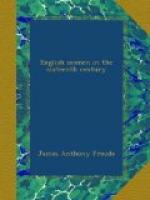The most ardent Catholic apologist will hardly maintain, in the face of this document, that the English Jesuits and seminary priests were the innocent missionaries of religion which the modern enemies of Elizabeth’s Government describe them. Father Parsons, the writer of it, was himself the leader and director of the Jesuit invasion, and cannot be supposed to have misrepresented the purpose for which they had been sent over. The point of special interest is the account which he gives of the state of parties and general feeling in the English people. Was there that wide disposition to welcome an invading army in so large a majority of the nation? The question is supposed to have been triumphantly answered three years later, when it is asserted that the difference of creed was forgotten, and Catholics and Protestants fought side by side for the liberties of England. But, in the first place, the circumstances were changed. The Queen of Scots no longer lived, and the success of the Armada implied a foreign sovereign. But, next, the experiment was not tried. The battle was fought at sea, by a fleet four-fifths of which was composed of Protestant adventurers, fitted out and manned by those zealous Puritans whose fidelity to the Queen Parsons himself admitted. Lord Howard may have been an Anglo-Catholic; Roman Catholic he never was; but he and his brother were the only loyalists in the House of Howard. Arundel and the rest of his kindred were all that Parsons claimed for them. How the country levies would have behaved had Parma landed is still uncertain. It is likely that if the Spanish army had gained a first success, there might have been some who would have behaved as Sir William Stanley did. It is observable that Parsons mentions Leicester and Huntingdon as the only powerful peers on whom the Queen could rely, and Leicester, otherwise the unfittest man in her dominions, she chose to command her land army.
The Duke of Alva and his master Philip, both of them distrusted political priests. Political priests, they said, did not understand the facts of things. Theological enthusiasm made them credulous of what they wished. But Father Parsons’s estimate is confirmed in all its parts by the letters of Mendoza, the Spanish ambassador in London. Mendoza was himself a soldier, and his first duty was to learn the real truth. It may be taken as certain that, with the Queen of Scots still alive to succeed to the throne, at the time of the scene in the House of Commons, with which I began this lecture, the great majority of the country party disliked the Reformers, and were looking forward to the accession of a Catholic sovereign, and as a consequence to a religious revolution.




